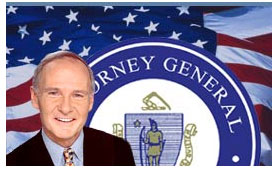Are the NorVergence Lessees being misled? by Christopher Menkin
Yes, the latest news is another state attorney general has achieved a NorVergence lease settlement with a leasing company. This time it is Massachusetts Attorney General Tom Reilly getting the majority of publicity with, "More than 200 small business owners from across the country – including 20 in Massachusetts – will either receive refunds or be cleared of $6 million in debt under the terms of a settlement." The press release said, “The settlement, filed (on Valentine's Day) in Suffolk Superior Court, resolves allegations that BB&T Leasing Corporation ("BB&T") knew or should have known that its financing agreements with more than 200 small businesses were fraudulent. At the center of the deceptive practices is NorVergence, a bankrupt New Jersey-based telecommunications provider, which misled customers into signing long-term contracts with promises of discounts on local, long-distance, wireless and Internet services.”
Massachusetts Attorney General Tom Reilly "This settlement will ease some of the financial pressures small business owners faced when they agreed to do business with NorVergence," AG Reilly said. "Today's action is the latest in a series of steps to hold NorVergence accountable for their scamming and deceptive practices." Wow, where in the release does it say “NorVergence” is making the settlement or paying a fine, or that the two founders will be punished and were responsible for the alleged fraud? This somehow has made the leasing company and NorVergence one and the same. No wonder the NorVergence lessees are blaming the leasing companies. Certainly the other attorneys general in the other states issued press releases, with the same twisted concept, repeated over and over again, so it now appears the 48 leasing companies are NorVergence Corporation and not separate entities. The villain is the leasing company. Here is another fact: only half of those offered the settlements by the 28 attorneys generals and District of Columbia have accepted them. In addition, a highly reliable source tells Leasing News they are the smaller dollar leases. Last year twenty-eight attorney general offices and the District of Columbia who took the leasing companies to task, eventually gaining $28.45 million they claimed to be owed by 1,371 NorVergence customers. The latest makes it 1,571 out of an alleged 10,000 leasing customers. All the lessee had to do was agree to the settlement, often 80% to 90% on the contract, including other costs incurred such as personal property tax, insurance, and late fees. They had 30 days to do this. Then the leasing companies had 30 days to inform the attorney general's office, and then make periodic reports, as payments spread out over a period of time at no interest were also part of the arrangement. "We do not have data yet from all leasing companies, but the data we have received indicates about a 50% acceptance rate (48.2%)." said Melissa A.Merz, Illinois Attorney General Press Room, representing told Leasing News on January 5, 2006. “ All 7 of the AVC we have so far have totaled a potential savings of over $7.28 million for Illinois consumers.” Those that signed the contract believe there are other issues involved, while those that purchased the contract say they were not aware of the NorVergence fraud and what the actual cost of the equipment and warranty is not their responsibility as purchasers of the contract. The leasing companies further claim their are victims. The others claim they are not really victims when they collect all the monthly payments. The lessee is the victim, and they don't want to be---let it be the “l.c.'s” Are the NorVergence lessees being misled?
A highly reliable source tells Leasing News the Federal Trade Commission has not been able to "prove fraud" or "collusion" on the leasing companies to date. There are many other issues that if they do not "pan out," they may be bowing out by as early as September or the latest, at the end of the year. This leaves many state attorney generals trying to enforce the various state laws that may apply to the leases. In several states, they are running for other offices. Whether the new attorney general will take up the same causes, or whether those who do win reelection to their present office, will continue a June, 2004 bankruptcy event. No, the FTC is not giving up, but they have a time frame to produce or move on. Several “blogs” and web sites of groups of NorVergence lessees are “fanatic” that they will get "triple" their money back in fines and penalties. There are three class action suits with over 2,500 putting money into a “war chest” who believe that they will not only get “justice” but land on the “Wheel of Fortune” number and earn “Big Money.” Others are “adamant” in their position. One NorVergence lessee on a listserve said this month his company, which he owns, has spent over $12,000 with his attorney to date. It is now over what he owes. He said he was willing to spend twice that, as he will never pay what the “l.c.'s” claim he owes them “for a $500 matrix box.” The latest rumor making the “blog” rounds is that Popular Leasing, Preferred Capital, IFC Credit, among others are about to throw in the towel. All indications are contrary to this “wish.” To sum it up, the issues appear both “political” and “emotional” directed. Now before we get the hate e-mail, and we get it from both sides, one thinks we are too critical of our industry, the other says we are not only taking the industry side, but speak for them--- let me declare as editor: We want to report the news fairly, without bias, and to be independent, not on one side or the other. As to the discovery of “Holdbacks,” 18% and 30% interest yields, or even higher amounts or huge discounts in buying a lease contract, these are not uncommon in this specific segment of the industry, particularly in an operating lease or true lease (remember, none of the NorVergence leases had a "residual" or "purchase option." The buying and selling of contracts may offend some, but that is the practice of commerce since biblical times. What the leasing company makes should be their business, such as what a restaurant charges for “leg of lamb” or a bottle of wine (some charge the same for a glass of the same wine you can buy the bottle for at retail store.) You don't like the price, don't go to the restaurant. You don't like the leasing company's monthly payment, don't sign the lease. In this NorVergence matter, the lessee thought they were signing a lease and getting service from one company, but the contract was sold to another. As long as they were getting “telephone service,” the lessee evidently didn't care who was collecting the monthly payment. When the service stopped, they wanted to stop making the monthly payments. The issue surrounds whether the leasing companies knew service was involved, and without it, the lease contract would be of little value to the lessee. We hope those involved also read the article we printed: When is a lease not a lease? http://www.leasingnews.org/archives/February%202006/02-14-06.htm#when Here are copies of the Wells Fargo, USB, and CIT settlements: http://leasingnews.org/PDF/Wells%20Fargo%20AVC%205-26-05.pdf http://leasingnews.org/PDF/USB%20AVC%20Final%205-26-05.pdf http://leasingnews.org/PDF/CIT%20AVC%205-26-05.pdf
|
 |



